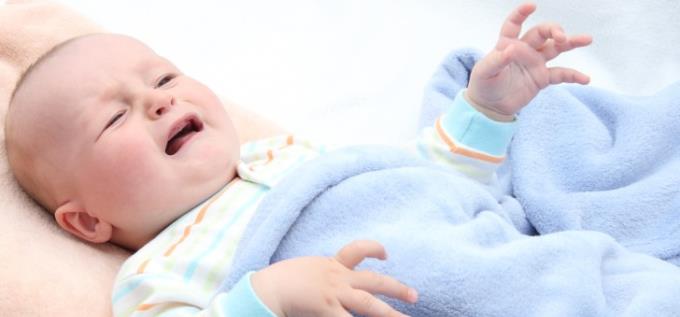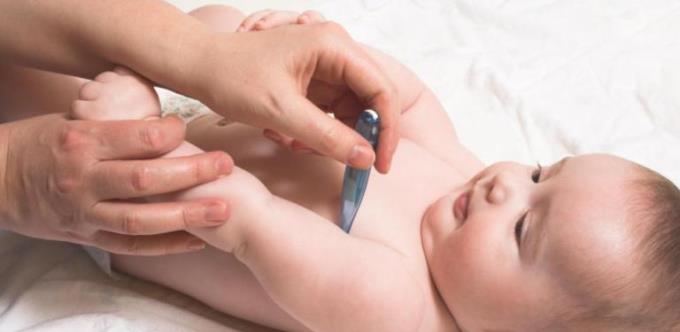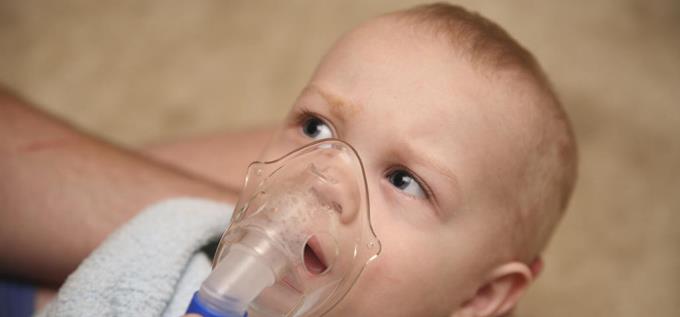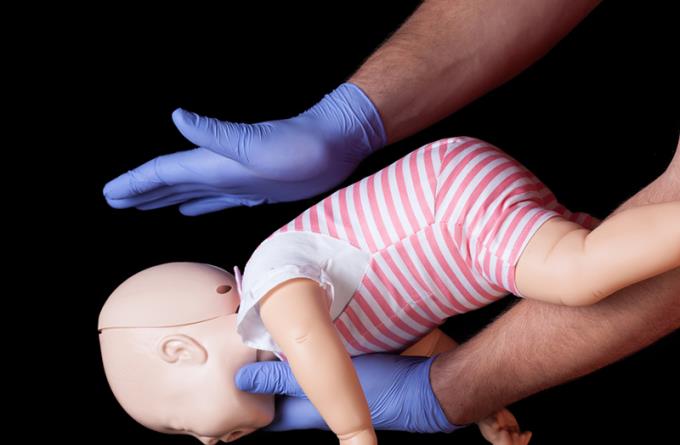Ways to determine an infants caloric needs

Learn how to determine your baby’s caloric needs, including the calories in breast milk and formula, to ensure your infant gets the right nutrition for healthy growth.
Does the infant cough, dry cough, wheezing or cough with phlegm ... make you worried? In fact, babies with a cough have many causes. Therefore, you need to know where your baby is coughing to have a timely treatment.
A baby's cough can be a manifestation of many problems. How normal and unusual an infant is coughing indicates that he or she is having a serious health problem. Let's find out through the following article.
Coughing is a beneficial reflex for the body, to protect the body from pathogens or expel foreign bodies from the respiratory tract. When the newborn has a respiratory disease, coughing helps the respiratory tract to clear, expel phlegm, nasopharynx, etc. out. There are two typical types of coughing in babies:
Dry Cough : A dry cough occurs when a child has a cold or allergy. Newborn dry cough is caused by an inflamed larynx and tracheal response to evening and night temperature changes, sometimes accompanied by wheezing.
Cough with phlegm : This is a manifestation of a respiratory tract infection. Babies with a cough have white or green mucus.
Babies (less than 4 months old) usually have less cough. Therefore, the cough can be caused by the following reasons:
Someone smokes in the house
You use charcoal to inhale after giving birth
The surrounding environment is too much smog pollution
The weather is changing
Infected baby: bronchitis, pneumonia, allergies, whooping cough ...
Baby choked, choking foreign objects
The baby is infected with respiratory syncytial virus (RSV).
Many babies suffer from wheezing cough because their lower respiratory tract increases mucus secretion to fight bacteria, viruses, or foreign objects in their trachea.

Having a cold or the common cold is the leading cause of coughing in babies. A baby coughing from a cold usually has the following signs:
Stuffy nose
There are signs of a sore throat
Dry cough
Also, depending on the severity of your cold, your baby may have: a cough with mucus, a mild fever at night.
To treat your baby's illness, you should do the following:
Feeding your baby enough : Give your baby enough milk, you can give your baby a little more water. The baby's feeding is effective in diluting phlegm to make it easier for the baby to cough.
Do not take cough and cold medicine arbitrarily: Doctors at the American Academy of Pediatrics recommend that you do not give cough and cold medicine to children under 6 years of age. These drugs sometimes cause side effects that seriously affect the child's health, even life.
Cough relief : If your baby has a cough due to a stuffy nose (stuffy nose), to reduce the child's cough, you can clean your baby's nose with saline water, use a nebulizer to humidify your baby to breathe easier. If your baby is one year older, you can give him honey mixed with warm water to dilute phlegm.
Fever-reducing medicine: You can give your baby fever-reducing medicine for babies if they have a high fever. But if your baby's fever is higher than 38 ° C and shows signs of fatigue, sluggishness, stop feeding, fussy ... you should immediately take your baby to the doctor. Fever, even mild fever, for children under 4 months old can be a warning sign of danger.
Bronchiolitis is one of the reasons babies experience coughing and wheezing. Inflammation of the trachea and larynx causes the lining of the trachea to swell, causing breathing difficulties in children, also known as tracheobronchitis . The disease usually occurs at night, so it sometimes makes children uncomfortable, fussy because it is difficult to breathe. If your baby has difficulty breathing with a high fever, you should seek medical attention promptly.
Signs of newborn bronchial laryngitis:
The child has weak breathing
Cough in short bursts and the cough is quite loud
Baby breath sounds like snoring or whistling through teeth
Baby's skin is pale
In severe cases, your baby will try to move the muscles around the nose, neck and arms to make it easier to breathe.
Treatments
First, you try to calm your baby's cough, like holding him in a shoulder position and patting his back. Then, use one of the following methods to ease your baby's breathing difficulties:
Hold the baby to sit in the bathroom, close the door, and open the hot shower so baby can breathe the hot and humid air.
If the weather is cool, the air is fresh, take your baby out for a walk, the humid and airy air will help your baby breathe easier.
Keep your baby in a room with a humidifier on.
Blocked laryngitis in children will decrease after 3-5 days. If, after this time, your baby's disease has not improved, you should take your baby to the hospital for prompt diagnosis and treatment by the doctor.

Pneumonia is an infection caused by a virus or bacteria when an infant has the common cold. Babies coughing from pneumonia often have green or yellow phlegm.
Treatment of pneumonia in a baby depends on the agent (virus or bacteria). Therefore, you should take your baby to the hospital for diagnosis and treatment, especially if your baby coughs with fever. Bacterial pneumonia is usually more dangerous than a virus, the most common being strep pneumonia.

Babies and young children with cough and wheezing caused by bronchitis and asthma often appear after a cold or runny nose. According to pediatricians, children under 2 years of age are less likely to develop asthma unless they have eczema (eczema) and someone in the family has allergies and asthma .
Most bronchiolitis cases in children younger than 1 year old are caused by the respiratory syncytial virus (RSV). This virus causes the common cold in children older than 3 years, but if it gets into an infant's lungs, it can cause serious health problems.
Infants with asthma cough and wheezing often have the following signs:
Your baby shows signs of a cold and has difficulty breathing
Baby has an itchy expression
The baby has tears
Bronchitis in young children is common in the fall and winter and may be accompanied by a mild fever, little or no food. You should feed your baby enough, drink additional water and use a mist to create moisture for your baby to breathe easily. When your baby is wheezing, you should monitor his breathing. If your baby breathes more than 50 breaths / minute, he or she is at higher risk of respiratory failure. You should take your baby to the hospital immediately
Sometimes, treating wheezing makes it easier for your baby to breathe, and doctors will give him asthma medicine even though he doesn't have it. If your baby has a severe cough or the condition worsens after 1-2 days, see your baby's doctor right away.
If your baby is coughing and wheezing due to severe asthma, the doctor may prescribe albuterol inhalation . To do this, you put albuterol in a nebulizer so that the liquid becomes a gas. Put your child on a mask so that he or she can inhale medicine more easily.

Pertussis is a disease caused by the bacteria Bordetella pertussis, which is highly contagious and fatal of the most vaccine-preventable illnesses. Bordetella pertussis attacks the lining of the airways, causing severe inflammation, narrowing and sometimes blocking the child's airways. Children with pertussis will cough one after another, faster and faster and weaker, then the stage of deep inhalation sounds like a rooster crowing. After each coughing spell, the baby has reddened face, purple lips, swollen eyelids, neck veins emerging.
In most cases of pertussis, the baby has no cold or fever symptoms. Babies with a cough caused by pertussis usually have the following signs:
Cough often, coughing in series
Tongue stuck out
Goggle
The color of the face changes.
If diagnosed with pertussis disease, your baby may be hospitalized for proper monitoring and treatment, supporting oxygen breathing during coughing spells.
The most effective way to prevent and treat is that you give your baby a full and on time pertussis vaccination. In addition, if possible, you or your babysitter should be vaccinated against tetanus , white blood cells, and enhanced pertussis to avoid spreading the disease to your baby.
Choking while sucking or playing with stuffed animals is also sometimes a cause of coughing in babies. To limit coughing , you should not breastfeed your baby, especially with formula-fed babies, do not leave stuffed animals around the baby's bedside because poor quality stuffed animals are very dangerous to their health .
In some cases, the baby may develop pneumonia due to food or foreign objects trapped in the airways. In addition, the choking of foreign bodies such as a small toy, buttons, peanuts, longan seeds, small food pieces ... also makes children cough violently. Foreign body choking is the most common cause of choking in young children. If your baby suddenly gasps or coughs suddenly while eating or playing with small details, check to see if your baby is choking.
If your baby is choking and an object has blocked his or her airway, your baby will have symptoms:
The baby cannot cough, his mouth is wide open
Baby's skin is pale or very pale due to lack of oxygen.
How to deal with foreign objects

Quickly help the baby lie on his back on his hand, you tap the space between the baby's shoulder blades so he can cough hard to help expel the foreign body.
If you cannot remove the foreign body, take your baby to the nearest medical facility for timely assistance. Absolutely do not use your hands to get the object because you can push the object deep inside.
In some cases, the doctor may give your baby an X-ray or a bronchoscopy to locate the object so that it can be easily removed from the baby's body.
Take your baby to the hospital right away if your baby has one of the following signs:
Baby is less than 4 months old and has a cough
A dry cough with signs of a cold lasts longer than 5-7 days without fever
A dry, productive cough is accompanied by cold symptoms and a fever of 38 ° C or higher
Wheezing or rapid breathing
Cough is paroxysmal, sudden and pulls in bouts
Blue or purple skin.
Infants are very young, so they have poor resistance and are susceptible to disease. Therefore, you need to equip yourself with knowledge so that you do not worry too much when your child is sick, not voluntarily giving them medicine will avoid negative effects on the child's health. Observe the child's signs carefully, if you notice any abnormalities, take your child to the hospital immediately. If you are not sure where your child's cough is caused, you should take your child to the doctor for timely examination, care or treatment.
Also, please refer to the article " Whooping cough in adults and children: Don't be underestimated!" ”For more information on whooping cough.
Learn how to determine your baby’s caloric needs, including the calories in breast milk and formula, to ensure your infant gets the right nutrition for healthy growth.
Discover the top 5 smartest dog breeds in the world, including Border Collie, Poodle, German Shepherd, Golden Retriever, and Doberman Pinscher. Learn about their unique traits and why they are considered the most intelligent dogs.
Discover 7 nutritious and delicious ways to cook egg porridge for babies, including recipes with cheese, pumpkin, tomato, and more. Learn how to prepare baby-friendly egg porridge with our expert tips.
After a series of medical measures they obtained a complete human vascular system profile.
Watermelon is one of the fruits that many people love, not only cheap but also delicious, nutritious and refreshing in the summer. To get delicious watermelon pieces, show off your housewives, your artistic talents to cut beautiful pieces of watermelon.
aFamilyToday Health - The digestive system and body in each baby is different. Parents need to recognize notes to deal with when babies have a food allergy!
Babies need many factors for perfect development. aFamilyToday Health shares with parents things to keep in mind when babies are 8 weeks old so that parents can take care of their babies the best!
Babies need many factors for perfect development. aFamilyToday Health shares with parents things to keep in mind when babies are 18 weeks so that parents can take care of their babies the best!
Babies need many factors for perfect development. aFamilyToday Health shares with parents things to keep in mind when babies are 28 weeks old so that parents can take care of their babies the best!
Babies need many factors for perfect development. aFamilyToday Health shares with parents things to keep in mind when babies are 32 weeks old so that parents can take care of their babies the best!








